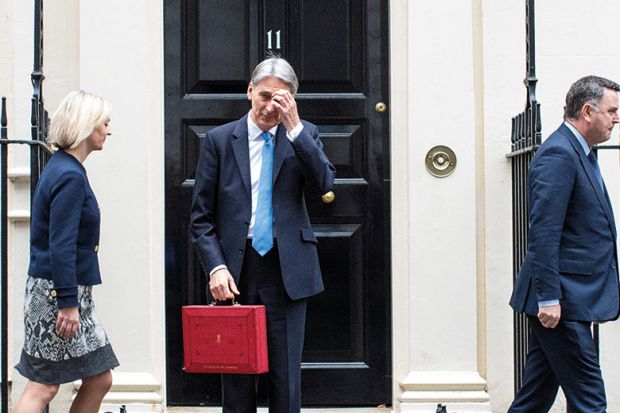Never has a recent Budget been more anticipated by those in the UK higher education sector than yesterday’s Autumn Budget 2017. After a summer of uncertainty surrounding tuition fees, the sustainability of student loans and the future of UK research funding, it is fair to say that the sector had been looking to chancellor Philip Hammond to provide some clarity on the state of play for UK universities.
Yet, the chancellor failed to deliver. Despite much speculation that we might finally learn the scope and aims of the higher education review promised by prime minister Theresa May at the Conservative Party Conference in October, the Autumn Budget gave only slight nods to our universities and their students.
Mr Hammond began by acknowledging universities and research institutes as being “at the forefront of a technological revolution”. However, the excitement was short-lived. In his speech, he ultimately failed to deliver any “big bang” announcements on future funding for UK research – presumably since the government is making us wait for further developments on its industrial strategy, due to be released over the coming weeks.
The Budget’s accompanying “Red Book” at least contains more information on the government’s long-term support for science and innovation, both in terms of finance and talent. As well as confirming additional spending on research and development over the coming years, taking the total direct spending to £12.5 billion per year by 2021-22, it also provides clarity on the future status of so-called international talent in the UK.
Specifically, the government has pledged to change immigration rules to make it easier for highly skilled international students to apply for work in the UK after completing their degrees and to reduce the red tape in hiring international researchers. This approach would allow the UK’s research councils and other sector bodies to sponsor individual scientists and researchers during the immigration process.
Most notably, the chancellor made no mention of tuition fees or changes to the current student finance system in his Budget speech – something that Labour leader Jeremy Corbyn subsequently seized on as being an “injustice”. For now, at least, students will have to make do with the current tuition fee freezes and the higher student loan repayment threshold, both announced in October.
The only beneficiaries of the Budget are those who have already graduated. The chancellor promised young people up to the age of 30 the opportunity to purchase “millennial” railcards and he offered assurances that they would not risk overpaying their student loans. However, the railcard is of use only for off-peak travel, while the latter probably seems like a distant dream to most students.
Admittedly, graduates and early career researchers choosing to settle in the South of England may have been more welcoming of the chancellor’s plan to invest in the Cambridge-Milton Keynes-Oxford corridor. The government’s pledge to build 1 million new homes in the area by 2050, to complete the Oxford to Cambridge rail link and to exempt first-time buyers from stamp duty for properties up to £300,000 nationally, may well appeal to young academics looking to set themselves up in the housing market in areas where properties are already reaching London prices.
However, even these measures are small offerings for a generation saddled with student loan repayments and rising house and rail prices.
Perhaps the only real success story in the Autumn Budget is the fact that the red book acknowledges the valuable contribution of a wide range of disciplines to the UK’s ambitions for R&D success. By alluding to “the digital technology, science, arts and creative sectors”, students, graduates and researchers today can at least have hope that all their skills, irrespective of their discipline, will be appreciated in the new economic powerhouse that the government seeks to establish.
Diana Beech is director of policy and advocacy at the Higher Education Policy Institute.
Register to continue
Why register?
- Registration is free and only takes a moment
- Once registered, you can read 3 articles a month
- Sign up for our newsletter
Subscribe
Or subscribe for unlimited access to:
- Unlimited access to news, views, insights & reviews
- Digital editions
- Digital access to THE’s university and college rankings analysis
Already registered or a current subscriber? Login





